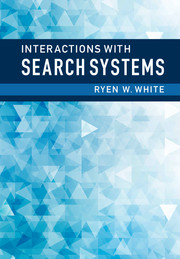13 - New Directions and Domains
from Part IV - Opportunities and Challenges
Published online by Cambridge University Press: 05 March 2016
Summary
A large number of advances in the design of interactive search systems are attainable given recent technological developments, coupled with an expansion in the range of ways in which people employ search technology as it becomes more pervasive. In light of these developments, search technology will play an increasingly important role in how people tackle problems and challenges in the world. Beyond utilitarian goals, such as addressing information needs or solving problems, search is expanding into new important domains such as casual-leisure search (e.g., searching for fun; see Ross [1999], Fulton [2009], and Elsweiler et al. [2011]), diagnostic search (e.g., self-diagnosing a medical condition or debugging a problem with computer code; see Cartright et al. [2011]), and social searching (e.g., searching for people or information about people; see Evans and Chi [2008] and Horowitz and Kamvar [2010]). There are a number of new directions in the area of search interaction that will receive significant attention over the next decade and beyond. These advances can be framed in terms of technologies and opportunities. I touched on some of these earlier in the book, but in this chapter I provide more detail on each of these areas.
Mobile and Cloud Computing
The growth in mobile computing, in particular the ownership and use of smartphones and other mobile devices such as tablets and slates, has led to an increase in the volume of search traffic on new devices, especially in relevant search segments such as local search. Beyond query volume, however, the range of tasks that people are attempting on their devices will also grow to accompany an evolution in user expectations. There are challenges associated with the transition from desktop to mobile searching that need to be addressed. For example, given the limited real screen estate on mobile devices and the difficulties associated with typed query input, the best search experience is yet to be determined (and we currently fall back to trusted presentation methods). Given different interaction paradigms, richer models of interaction with mobile devices (e.g., Guo et al., 2013), as well the development of dedicated search applications for these devices, are both important in next-generation search systems.
- Type
- Chapter
- Information
- Interactions with Search Systems , pp. 387 - 404Publisher: Cambridge University PressPrint publication year: 2016



